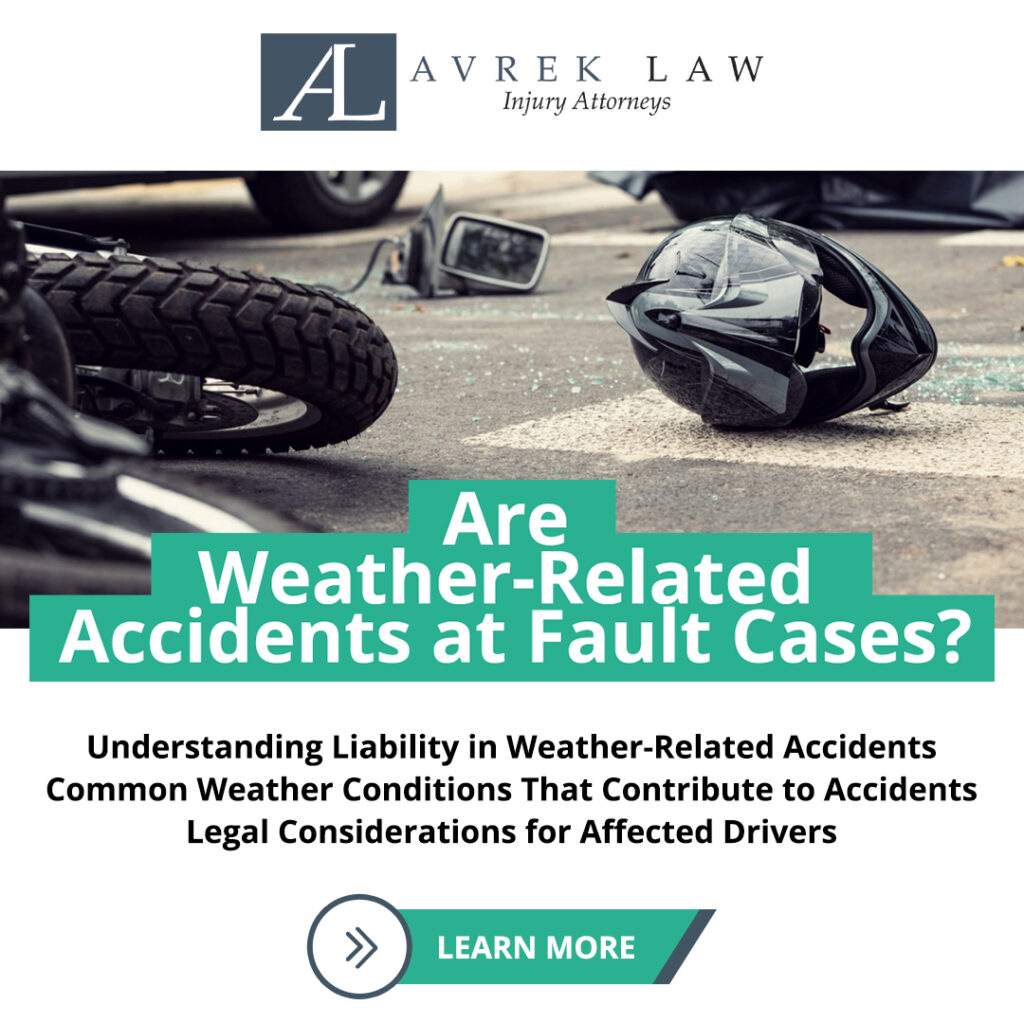
Weather-related accidents are incidents influenced by adverse weather conditions, like rain, snow, or fog. This raises a crucial question: Are weather-related accidents at-fault cases, and if so, who is at fault? Understanding fault and liability is paramount for drivers and the legal process, especially when it comes to weather-related accidents in Los Angeles.
The Role of Weather in Accidents
Driving in adverse weather conditions significantly heightens the risk of accidents due to factors like reduced visibility and slippery roads. Reduced visibility affects the driver’s ability to anticipate and react to obstacles to other vehicles. Slippery roads mean vehicles may skid, slide, or hydroplane, making it difficult for drivers to steer, brake, or accelerate as intended.
How Weather-Related Accidents Happen and How to Avoid Them
According to a recent data study analyzing car accidents in LA, wet weather sees a staggering 140% increase in accidents. One of the most common weather-related accident scenarios is a car crash in rain. Wet roads and compromised visibility make accidents more frequent during heavy rainfall, and studies show that accidents peak during the middle of the day in rainy conditions.
On average, drivers are 80% more likely to experience an accident when driving in rainy conditions than in clear conditions. This is due to the increased danger of high-speed driving on wet surfaces, emphasizing the need for cautious driving during rain.
While factoring weather conditions into accident investigations is essential for accurate fault determination, knowing how to drive in heavy rain can be a life-saving skill. Plan your route depending on the conditions, never try to drive through a flooded area, make sure your vehicle and tires are in good repair, and drive cautiously but safely.
What “At Fault” Means in Weather-Related Accidents
In legal terms, being ‘at fault’ means understanding the level of responsibility a person carries for an accident. It explains how much their actions or negligence contributed to an accident.
Contributory negligence and comparative negligence are legal concepts that impact fault. Contributory negligence occurs when the injured party’s actions also contributed to the accident. Comparative negligence assesses each party’s fault, adjusting compensation based on their respective degrees of negligence.
If you’re wondering if a tire blowout is an at-fault accident due to negligence, the answer depends on the specific circumstances. However, if it’s determined that the driver didn’t maintain proper tire condition or pressure, they may be considered partially at fault, especially if the blowout caused an accident.
Determining fault in weather-related car accidents involves investigating various factors like traffic laws, witness statements, and evidence. It depends on questions raised during the investigation, such as whether a passenger is liable for a car accident. Passenger fault is a complex issue, but generally, passengers are typically not held liable since they’re not driving. However, if a passenger influences reckless driving, they could share liability.
The bottom line is that weather conditions significantly influence accidents. Courts factor in how weather contributed to an accident when determining fault, so understanding how weather can play a factor in at-fault determination and liability is essential for pursuing rightful compensation for any damages you may have suffered.
What to Do if You’ve Been in a Weather-Related Car Accident
Being in a car accident can be scary. If anyone is injured, call 911 for help immediately. Next, gather as much information as possible to prepare you to deal with the insurance company. If you are able, make sure to document the scene and gather evidence. Capture photos and video of the accident area, weather conditions, and any visible injuries. Collect the insurance information of any other drivers involved in the accident. If a police report is made, read it to ensure it is accurate, as wrong information on a police report or other inaccuracies can affect your claim.
Navigating the intricacies of and dealing with auto insurance adjusters after the accident can be challenging. Using the evidence you documented at the scene, give truthful details to your auto insurance adjuster or car accident attorney. Calling an experienced car accident lawyer like those at Avrek Law Firm is always in your best interest.
If you’ve been injured in an accident and are still wondering, “Are weather related accidents at fault claims?” you may need additional support from an auto accident lawyer whether or not you believe you were at fault. Avrek Law has recovered more than $1 billion for accident victims in over 45,000 personal injury cases, including clients from Los Angeles. If you’ve been injured in a weather-related accident, we’re here to help – view our locations and contact us at (866) 598-5548 or visit our website for a free consultation to learn more today!
How much is your case worth?
Get a free case evaluation